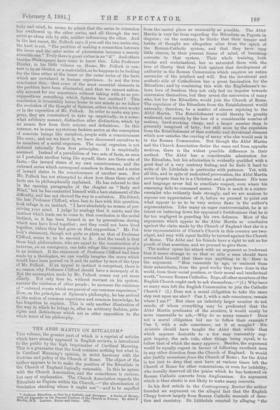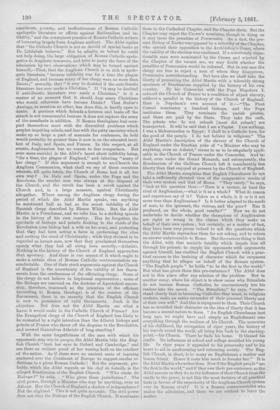to be expelled universe, on an emergency, can take refuge
like common people The author opens his attack with an argument so irrelevant in an instinct. If the statement of Professor Clifford had been that it seems strange to us that so able a man should have made by a theologian, we can readily imagine the scorn which persuaded himself that there was anything in it.' Here is would have been poured on it and its author by men of the type the argument. " Men venerable by age, or eminent from of Mr. Pollock. If an appeal to instinct is competent, there is their antecedents, from the good. works they have done in the no reason why Professor Clifford should have a monopoly of it. world, from their social position, or their moral and intellectual But the assumption made by Mr. Pollock comes out yet more worth," become Roman Catholics. Ergo, all other members of the clearly. Not only does ho, without warrant on his system, English Church ought each to ask themselves,—" (1.) Why have assume the existence of other people ; he assumes the existence so many men left the English Communion to join the Catholic. of " outward events which are parcel of our common experience." Church P (2.) Does not a moral obligation to take the same How, on the principles of Spinoza's philosophy, he has arrived step rest upon me also P Can I, with a safe conscience, remain at the notion of common experience and common knowledge, he where I am ?" But since an infinitely larger number do not has forgotten to explain. This is only another illustration of secede, of whom everything may be predicated that the the way in which he brings in, after an arbitrary fashion, prin- Abbe Martin predicates of the seceders, it would surely be ciples and distinctions which arc in utter opposition to the more reasonable to ask,—Why do so many remain P Does, whole tenor of his philosophy, not a moral obligation bid me to follow their example P Can I, with a safe conscience, set it at nought P His THE ABBE MARTIN ON RITUALISM.* Aristotle should have taught the Abbe that while that which appears desirable to a few may reasonably Bug Tins volume, the greater part of which is a reprint of articles - which have already appeared in English reviews, is introduced gest inquiry, the safe rule, other things being equal, is to to the public by the high imprimatur of Cardinal Manning. follow that of which the many approve. Besides, the argument This is a guarantee that the book contains nothing but what is, would be equally cogent in favour of following excellent men in Cardinal Manning's opinion, in strict harmony with the also so j a yust n other ify secessions from the Church of Rome ; direction from the Church of Englan fod. r the Abbe It would doctrine and policy of the Church of Rome. The object of the is too just to deny that men have at various author appears to be to make the position of the Ritualists in rious times left the Church' of Rome for other communions, or even for infidelity, the Church of England logically untenable. In this he agrees ty, who morally deserved all the praise which he has bestowed on with the Church Association, and the coincidence is curious, Ronian Catholic converts from Anglicanism. An argument but easy of explanation. The Church Association regards the which is thus elastic is not likely to make many converts. Ritualists as Papists within the Church,—" the abomination of desolation standing where it ought not"—and In his first article in the Contemporary Review the author founded an argument on the alleged fact that the English Anglican Rana/ism, as Sun by a Catholic and Foreigner. A Series of 1R:rays, Clergy borrow largely from Roman Catholic manuals of devo- with an Appendix on the Present Position of the Church in Frame. By AbbtS P. Martin, D.D. London : Burns and Oates. 1881. tion and casuistry. Dr. Littledale retorted by alleging "the scantiness, poverty, and ineffectiveness of Roman Catholic apologetic literature or efforts against Rationalism and in- fidelity," and the consequent practice of Roman Catholic writers of borrowing largely from Anglican authors. The Abb6 replies that " the Catholic Church is not so devoid of special books as Dr. Littledale believes." But he admits, as indeed he could not help doing, the large obligation of Roman Catholic apolo- getics to Anglican resources, and tries to parry the force of the admission by two observations which may be turned against himself,—First, that the Anglican Church is so rich in apolo- getic literature, " because infidelity was for a time the plague of England, and because many of her clergy were no more than Deists ;" secondly, that " it may be doubted if the anti-Deistic literature has ever made a Christian." If "it may be doubted if anti-Deistic literature ever made a Christian," is it a matter of no moment that it should keep many Christians who would otherwise have become Deists P That Butler's Ana/09y, to mention no other, has done this, is hardly open to doubt. A garrison which defends a fortress and beats off the attack is not unsuccessful because it does not capture the army of the assailants in addition. If Roman theologians had occu- pied themselves more with the diversified problems which perplex inquiring minds, and less with the petty casuistry which make up so large a part of manuals for confessors, its hold would probably be greater than it now is on the educated intel- lect of Italy, and Spain, and France. In this respect, at all events, Anglicanism has no reason to fear comparison. But even more suicidal is the Abbes taunt about infidelity being, "for a time, the plague of England," and infecting "many of her clergy." If this argument is enough to un-Church the Anglican Communion, what shall we say of those countries wherein, till quite lately, the Church of Borne had it all her own way P In Italy and Spain, under the Pope and the Bourbons, the secular arm was always at the disposal of the Church, and the result has been a revolt against the Church aud, in a large measure, against Christianity altogether. Where among the Anglican clergy during the period of which the Abb6 Martin speaks, can anything be mentioned half as bad as the secret infidelity of the Spanish clergy described by Blanco White. But the Abb6 Martin is a Frenchman, and we refer him to a striking episode in the history of his own country. 'Has he forgotten the spectacle of bishops and priests flocking to the chiefs of the Revolution (one bishop had a wife on his arm), and protesting that they had been acting a farce in performing the rites and reciting the creed of Christianity ; while they claimed to be regarded as honest men, now that they proclaimed themselves openly what they had all along been secretly,—Atheists. Nothing in the history of the Church of England approaches that apostasy. And there is one aspect of it which ought to make a certain class of Roman Catholic controversialists un- comfortable. One of their stock arguments against the Church of England is the uncertainty of the validity of her Sacra- ments from the carelessness of the officiating clergy. Some of the clergy do not believe in baptismal regeneration ; some of the Bishops are unsound on the doctrine of Apostolical succes- sion; therefore, inasmuch as the intention of the officiant I was a Mahornmedan in Egypt ; I shall be a Catholic here, for the good of the people. I do not believe in religions." The Abb6 Martin's description of the slavery of the Church of England under the Erastian yoke of " a Minister who may be anything, even an Atheist," seems to us to be singularly appli- cable to the Church of France under the Concordat. And in- deed, oven under the Grand Monarch, and subsequently, the Erastianism of the Galilean Church left it considerably less liberty than that enjoyed at present by the Church of England. The Abb6 Martin complains that English Churchmen do not take a sufficiently elevated view of the comparative merits of their own system and that of Rome. "They rarely," ho says, " look at the question thus Here is a system, at least the rival of Anglicanism,—what is it as a whole ? What do reason and experience say of it P Taken as a whole, is it or is it not more true than Anglicanism P Is it better adapted to the needs of man, to the ignorant, the vicious, and the poor P Has it produced, on the whole, good results P' " Now we do not undertake to decide whether the champions of Anglicanism are right or wrong in the claims which they make on behalf of their own system ; but certainly, as a matter of fact, they have been very prone indeed to ask the questions which the Abb6 Martin reproaches them for not asking, and to return an answer unfavourable to Rome. But the curious thing is that the Abbe, with that amiable fatality which impels him all through his polemic to supply his opponents with arguments against himself, has credited the English Church with a prac- tical success in the training of character which far surpasses anything that he alleges on behalf of the Roman system. "The English people " he holds "to be the first in the world." But what has given them this pre-eminence P The Abb6 does not in this place offer any solution of the problem. But in another essay, where his object is to show cause why Ritualists do not become Roman Catholics, he unconsciously lets his readers into the secret. "The Ritualists," ho says, " under. stand clearly that in becoming Catholics they must, in religious matters, make an entire surrender of their personal liberty and of their own will." And this is repugnant to them. Their Church has so moulded their character on the idea of liberty that it has become a second nature to them. "An English Churchman (not long ago, we might have said simply an Englishman) sees everything through the medium of his Church. The memories of his childhood, the occupation of riper years, the history of his travels round the world, all bring him back to the starting. point,—his Church. There he finds his home. It blessed his cradle. Its influences at school and college moulded his young life. In riper years it appealed to his generosity and to his heart to aid in ameliorating and reforming society. The Eng- lish Church, in short, is to many an Englishman a mother and bosom friend. Hence it costs him much to forsake her." It is the Abb6 Martin who writes thus. Now if the English people "are the first in the world," and if they owe their pre-eminence, as the Abb6 assures us they do, to the influence of their Church from the cradle to the grave, is not this the most decisive of all practical tests in favour of the superiority of the Anglican-Church system over its Roman rival P It is a Roman controversialist who makes the admission, and there we are content to leave the matter.



































 Previous page
Previous page